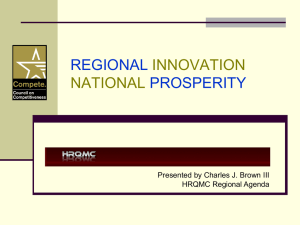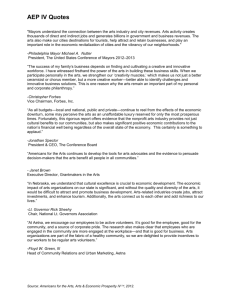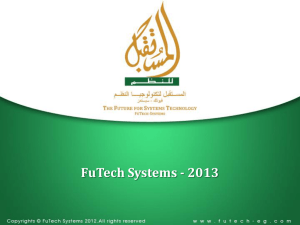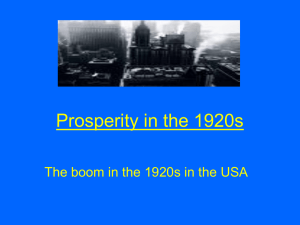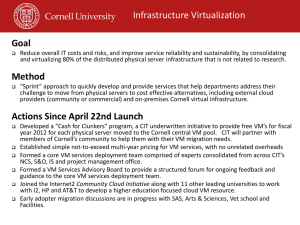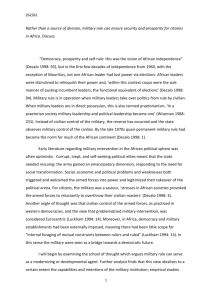38 Herbst, op. cit., p.14
advertisement
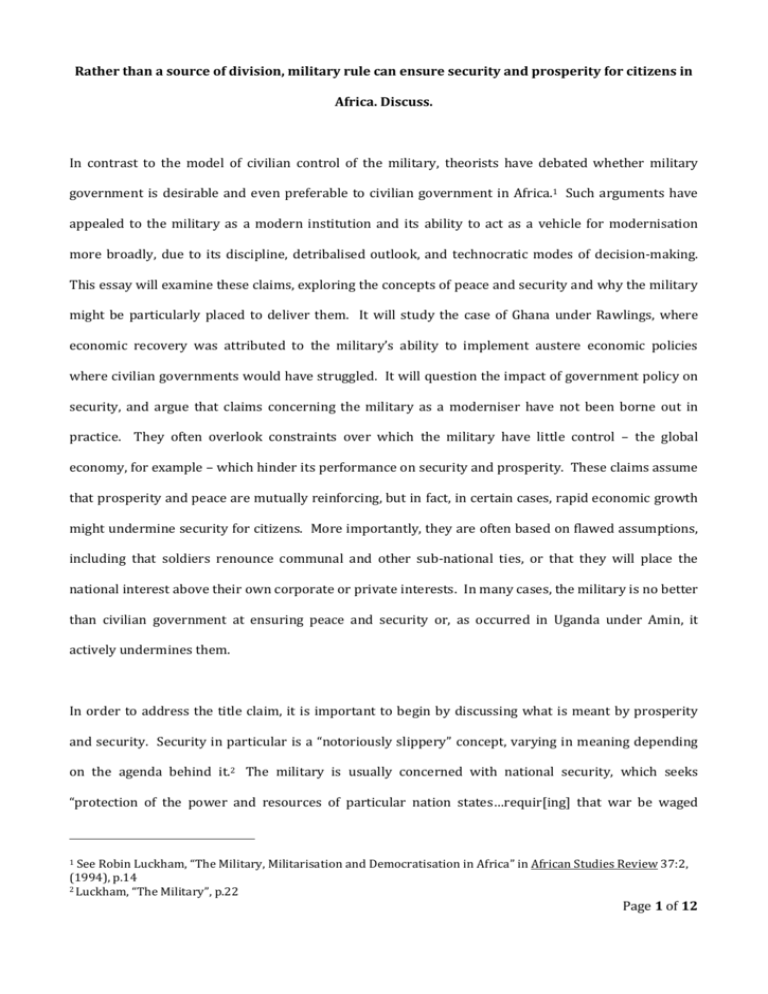
Rather than a source of division, military rule can ensure security and prosperity for citizens in Africa. Discuss. In contrast to the model of civilian control of the military, theorists have debated whether military government is desirable and even preferable to civilian government in Africa.1 Such arguments have appealed to the military as a modern institution and its ability to act as a vehicle for modernisation more broadly, due to its discipline, detribalised outlook, and technocratic modes of decision-making. This essay will examine these claims, exploring the concepts of peace and security and why the military might be particularly placed to deliver them. It will study the case of Ghana under Rawlings, where economic recovery was attributed to the military’s ability to implement austere economic policies where civilian governments would have struggled. It will question the impact of government policy on security, and argue that claims concerning the military as a moderniser have not been borne out in practice. They often overlook constraints over which the military have little control – the global economy, for example – which hinder its performance on security and prosperity. These claims assume that prosperity and peace are mutually reinforcing, but in fact, in certain cases, rapid economic growth might undermine security for citizens. More importantly, they are often based on flawed assumptions, including that soldiers renounce communal and other sub-national ties, or that they will place the national interest above their own corporate or private interests. In many cases, the military is no better than civilian government at ensuring peace and security or, as occurred in Uganda under Amin, it actively undermines them. In order to address the title claim, it is important to begin by discussing what is meant by prosperity and security. Security in particular is a “notoriously slippery” concept, varying in meaning depending on the agenda behind it.2 The military is usually concerned with national security, which seeks “protection of the power and resources of particular nation states…requir[ing] that war be waged See Robin Luckham, “The Military, Militarisation and Democratisation in Africa” in African Studies Review 37:2, (1994), p.14 2 Luckham, “The Military”, p.22 1 Page 1 of 12 simultaneously upon the dissenter within and upon the adversary abroad”.3 This is distinguished from security for citizens, which this essay will understand as protection from foreign invasion, civil war, rioting and repression. The distinction between different agendas and definitions of security will prove important, as rulers may invoke a particular concept of security to protect their own interests or actively undermine the security of the wider citizenry. In the case of prosperity, this can be more or less demanding of military rulers, depending on the definition in use. For example, it may refer to simply to rates of economic growth, or it may require equality for citizens, include redistribution alongside growth. This latter point is salient where countries see persistent growth but the benefits do not reach citizens: in Nigeria, for example, the revenues from its oil wealth have largely accrued to elites and their supporters, failing to benefit the nation as a whole. This essay will focus on prosperity in macroeconomic terms, looking at indicators such as inflation as well as annual growth rates, while taking corruption and the overall distribution of wealth into account to ensure a focus on citizen benefit rather than purely elite gain. Why, then, might military rule ensure security and prosperity? Theorists have argued that the military possesses certain characteristics that make it well-suited to ensuring prosperity and security. Its modernity is seen as crucial: where established by European colonial powers, African militaries were modelled on the bureaucratic, secular armies of the metropole. With their emphasis on hierarchy, discipline and the priority of ‘rational’ behaviour over tradition, they were “the most detribalised, westernised, modernised, integrated, and cohesive institutions in their respective States”.4 The military inculcates a sense of unity and national identity amongst its soldiers by emphasising a common bond and loyalty, reinforced through balanced recruitment, integration and advancement based on merit, which encourages them to abandon communal and sub-national ties.5 This was expected to encourage detribalisation throughout society as a whole, as “when men and officers leave the armed services they Robin Luckham, “Security and Disarmament in Africa”, Alternatives 9:2, (1982), p.204 Ernest Lefever, Spear and Sceptre: Army, Police and Politics in Tropical Africa, (Washington: 1970), p.21 5 Ibid., p. 178 3 4 Page 2 of 12 take with them a more developed sense of national consciousness and pride”,6 spreading these values in civilian society. Moreover, the military is a “vivid and tangible symbol of the state” with which citizens may come to identify and value. 7 Insofar as the strength of communal identities and lack of national unity pose a threat to security, such a process would help to ensure security for citizens. The military is also thought to be a source of stability in times of upheaval, feeling a sense of duty to the state to prevent disorder or state collapse.8 It is professional, due to its expertise in the management of violence, its strong corporate identity and sense of social responsibility to society.9 While Huntington’s conception of the professional military is subject to civilian control, this is largely drawn from the European experience, and Stepan’s ‘new professionalism’ may better reflect the African experience. Here, the officer’s area of expertise is not limited to the management of violence, but also includes other interrelated military and political skills, giving it the impetus to intervene in politics.10 Indeed, military rulers often justify intervention on the grounds of their location above partisan politics and communal groups, claiming a unique role in safeguarding the nation’s interests. In terms of prosperity, military leaders have been seen as “uniquely qualified to be the managers of national development”.11 The military was a model of an industrial organisation in pre-industrial societies, using Western military technology and focuses on rapid technical innovation as essential for military success. Organised on a skill specialisation basis, it demands skills in short supply, and so provides a “training ground for technical and administrative skills”,12 which could then be transferred to the civilian economy. Moreover, the military was thought to play a role in expanding opportunities for training in these skills in the civilian economy: officers are “extremely sensitive to the needs of Ibid. Ibid., p.175 8 Luckham, “The Military”, p.14 9 Samuel Huntington, The Soldier and the State: The Theory and Politics of Civil-Military Relations, (New York: 1964) 10 Alfred Stepan, “The New Professionalism of Internal Warfare and Military Role Expansion,” in Alfred Stepan (ed.), Authoritarian Brazil: Origins, Policies, and Future, (New Haven:1973) 11 Luckham, “The Military”, p.48 12 Morris Janowitz, Military Institutions and Coercion in the Developing Nations, (Chicago, London: 1977), p.151 6 7 Page 3 of 12 modernisation and technological advancement”,13 pushing them to demand change in their societies in order to meet these needs. Pye argues that the military is likely to be uniquely vociferous in demanding development, due to its tendency to focus on the future and compare itself with other military organisations when appraising external threats, along with its propensity to overlook obstacles to modernisation owing to its distance from civilian life.14 Often they relied on civil servants and excluded politicians and political groups; this technocratic style of decision-making was seen as preferable to political considerations, which focused on retaining political support and building political resources.15 Such insulation from public and political pressure was felt to result in better policy choices, as the military could decide based on rational, apolitical criteria and was better equipped to withstand popular opposition to necessary but unpopular policies, “push[ing] through adjustments elected governments could not have contemplated”.16 This latter point has been advanced with reference to economic reform in Ghana under Rawlings. 17 Between 1984 and 1990, Ghana saw average annual growth rates of five percent, falling inflation, incremental real wage growth and the return of aid flows. The government was subsequently able to invest in infrastructure, extending the national grid to the northern region and repairing roads and other transport links. This economic success was attributed to the Rawlings military government’s structural adjustment programme, which undertook measures including devaluing the exchange rate, improving incentives for producers – particularly in agriculture – and cutting public spending. Such policies would have been unpopular with citizens due to the short term costs - including wage cuts or job losses, increased prices for goods and imports - and the time lag before benefits would accrue, if at all. Consequently, commentators have argued that the nature of military government was important in the implementation of such policies: “the PNDC's discipline and ability to act ruthlessly probably made Lucian Pye, “Armies in the Process of Political Modernisation”, European Journal of Sociology 2:1, (1961), p.86 Ibid., p.87 15 Eric Nordlinger, Soldiers in Politics: Military Coups and Governments, (New Jersey: 1977), p.119 16 Luckham, “The Military”, p.50 17 Jeffrey Haynes, ‘Human Rights and Democracy in Ghana: The Record of the Rawlings Regime’, African Affairs, 90:360, (1991), p.423 13 14 Page 4 of 12 possible the depth and extent of economic reforms”.18 Rawlings’ government strictly enforced the new measures, ensuring compliance with new prices, and was able to contain opposition from urban and labour constituencies. They highlight that Ghana’s perseverance with reforms contrasts with attempts at similar programmes elsewhere on the continent; for example, Herbst points to Senegal as an example where reform failed due to insufficient political commitment.19 Yet this account can be questioned: to what extent was Ghana’s prosperity uniquely attributable to military rule? Insulation from public opposition and strong implementation are not advantages exclusive to military rule, but a feature of authoritarian rule more generally: a civilian ruler could force through unpopular reforms, albeit dependent on army or paramilitary backing, lacking the direct access to force enjoyed by the military. Furthermore, the measures used to implement prosperity undermined security for citizens in Ghana:20 repression was widespread and acute following the Provisional National Defence Council’s (PNDC) ascent to power and during the implementation of these reforms. PNDC Law 4 gave the military the power to detain suspected opponents without charge. There were cases of beating and ill-treatment of prisoners, extra-judicial executions, and unfair trials for political opponents, and “violence was directed in a highly decentralised manner against many members of society”.21 This implies a possible relationship between prosperity and security; those advocating for the military as modernisers have generally considered growth and security to be mutually reinforcing,22 pointing to the economic damage instability and war cause through loss of life, damage to infrastructure, and capital flight. At the same time, instability becomes more likely in times of economic decline, as people grow frustrated with the lack of development and job opportunities. However, security and prosperity may be incompatible in some cases: as in Ghana, the implementation of economic reform can herald Ibid., p.424 Jeffrey Herbst, The Politics of Reform in Ghana, 1982-1991, (Berkeley:1993), p.4 20 Haynes, op. cit., p.424 21 Herbst, op. cit., p.68 22 Luckham, “The Military”, p.14 18 19 Page 5 of 12 significant repression of citizens. Similarly, Huntington argues that rapid economic growth can lead to instability. He separates modernisation, the process of social and economic change, from political development, “the institutionalisation of political organisations and procedures”,23 and highlights that rapid socioeconomic change can foster political instability through its impact on societal values and behaviour. It can breed corruption which, while perhaps having other positive features – for example, allowing citizens to circumvent an inefficient bureaucracy – nevertheless weakens political institutions. This could pose a problem for security: if institutions do not provide a way of addressing grievances and socioeconomic pressures within the political system, citizens may resort to violent extra-political means to vent their frustrations. This problem is compounded by military rule, to the extent that by intervening it makes “the construction of viable and legitimate political institutions more difficult than ever”,24 either due to the disruptive effect of military intervention and the precedent it sets for the future, or measures implemented by military rulers that actively undermine political institutions. For example, the Rawlings regime’s introduction of a new court system, reliant on people’s judgements about their fellow citizens, was perceived as an attack on the judiciary.25 These limitations are not restricted to the Ghanaian case: looking at military performance in Africa more broadly, “the armed forces have not fulfilled the predictions…that their organisation, modernity and nationalism would make them the leaders of the modernisation process in their countries”.26 One explanation is that Pye et al overlook the nature of constraints facing the military: should we assume that the military can remake society in its own image, and that it can succeed where a civilian government cannot? Concerning detribalisation, for example: national unity is difficult to build from the top-down, and often risks exacerbating tensions. In Nigeria, General Ironsi attempted to unite the country following the January 1966 coup through Decree 34, dissolving the federation in favour of a unitary constitution. However, this was viewed as part of a broader Igbo conspiracy to seize and Samuel Huntington, “Political Development and Political Decay”, World Politics 17:3, (1965), p.393 Mazrui, “Soldiers as Traditionalisers: Military Rule and the ReAfricanisation of Africa”, Journal of Asian and African Studies 12:4, (1977), p.249 25 Haynes, op. cit., p.409 26 Claude Welch, quoted in Mazrui, op. cit., p.249 23 24Ali Page 6 of 12 consolidate control of the country, and provoked riots and a counter-coup by northerners later that year. Similarly, the record of military rulers in delivering prosperity is perhaps unsurprising, given the global economic constraints military rulers face along with civilian rulers: while the impact of low commodity prices and low global trade can be mitigated through economic policy, it cannot be neutralised completely. Dependency theorists would further argue that the military’s ability to deliver prosperity is constrained by the structure of the global economy, and until Africa is integrated on more favourable terms, leaders will struggle to bring development. A second – and arguably more important – argument is that military rule is itself the problem. For example, Haynes highlights that insulation from popular opinion may become an obstacle to prosperity rather than a virtue, particularly when repression is used, as it can leave rulers cut off from valuable information when they need to fine-tune policy or cooperate with civil society on implementation.27 Without some political input, rulers can implement policies that are rational and technically sound but inappropriate to the particular context, overlooking relevant social, economic, political and cultural factors and how these might affect policy implementation.28 Indeed, Nordlinger argues that the military tends to overlook such factors and overestimate the influence of their policies, posing a problem for effective policymaking.29 Although theorists highlighted the technical-managerial nature of military decision making as a virtue for modernisation, it is not clear that the skills and knowledge relevant to the military sphere are transferable for economic policy making. In the same way, is the military truly a moderniser? As Mazrui highlights, the military often retraditionalises society,30 and while this is not incompatible with the military acting as a moderniser in other circumstances, it implies that the case for modernisation is not straightforward. Mazrui draws on the example of Amin in Uganda, pointing to his use of witch-doctors and his belief in the power of dreams; similarly, one could look at Mobutu Sese Seko’s authenticity campaign which attempted to re- Herbst, op. cit., p.160 Nordlinger, op. cit., p.168 29 Ibid. 30 Mazrui, op. cit. 27 28 Page 7 of 12 Africanise society. It is not clear that the military is itself detribalised, undermining the claim that the military can act as a vehicle for detribalisation in society. While soldiers may feel a greater sense of nationalism and common identity than civilians, it may not replace or even take primacy over other identities. As Mazrui argues, although the military as an institution may be modern, due to its reliance on technology and hierarchy, “the individual men in uniform remain relatively steeped in primordial beliefs and traditionalist tendencies”, and these traditional views become more important when the military governs directly. 31 The military may even retribalise recruits and aggravate ethnic divisions.32 Recruitment patterns are often unbalanced: for example, northerners dominated the Nigerian military was at independence, as did the Acholi in Uganda, and “as the more or less exclusive preserve of a particular communal segment, the officer corps is strongly inclined to act on behalf of its interests” rather than pursue national unity.33 Even if the military were representative and united, it would not necessarily act in the national interest: the military has its own corporate interests, which often diverge from those of the public. The military budget is a key example: proponents of military rule have argued that military spending drives industrialisation and so development forwards,34 but development often also requires investment in infrastructure and education. Military rulers may be unwilling to divert money into other investments, as “economic growth is desired, but not at the military’s expense”.35 On average, the proportion of the overall government budget allocated to military spending increases by fifty to seventy-five percent under military governments.36 In other cases, military rulers do not have a developmental strategy at all, pursuing ad hoc policies to benefit the military. For example, the 1966 coup in Ghana had “no ideological overtones, nor was there any concrete programme of action aimed at solving the country's problems”.37 Ghana’s economic trouble pre-Rawlings was a “political recession”, caused by successive Mazrui, op. cit., p.252 Ibid., p.260 33 Nordlinger, op. cit., p.155 34 Luckham, “The Military”, p.20 35 Nordlinger, op. cit., p. 166 36 Ibid., p. 167 37 Ibid. 31 32 Page 8 of 12 governments’ use of economic resources for patronage.38 Governments, civilian and military, sustained an overvalued exchange rate and distortionary exchange rate system due to the opportunities for patronage it brought. Corruption was rife, with National Liberation Council officers using foreign exchange reserves to purchase luxury items. Indeed, while coups are often justified on the need to purge civilian corruption, “military governments are on the whole no less corrupt and self-serving than civilian ones. It has even been said that [they] are more corrupt and self-indulgent than their civilian predecessors”.39 Likewise, security is subject to manipulation by the military in pursuit of its own ends. Pye et al assume that the military will enforce security as a public good, but in practice, security is often “the security of the existing ruling classes…[and] may well have very little to do with that of the people they govern”.40 Military governments often have latent as well as manifest security agendas, enacting policy that they claim ensures security for the masses but is in fact predicated on the military’s private interests.41 This is highlighted in the case of the Rawlings’ government: the PNDC justified repression on the basis that “opposition to the regime [was] perceived as the activity of individuals or small groups whose motivation [was] self-gain”.42 Yet it was also “motivated by self-interest in its treatment of political and economic dissidents”,43 acting to consolidate its rule rather than purely in the public interest. At the extreme, the military’s power of coercion may be used to exploit and terrorise citizens, as in Sierra Leone and Liberia, where “the military itself became the main source of predatory instability” using violence as a means of accumulation.44 Rather than ensuring security, the state under such forms of military rule becomes an instrument of insecurity. Herbst, op. cit., p.14 Nordlinger, op. cit., p. 127 40 Luckham, “Security and Disarmament”, p.217 41 Luckham, “The Military”, p.22 42 Haynes, op. cit. p.413 43 Ibid. 44 Jimmy Kandeh, “What does the ‘Militariat’ Do when it Rules? Military Regimes, the Gambia, Sierra Leone, and Liberia”, Review of African Political Economy 23:69, (1996), p.404 38 39 Page 9 of 12 The case of Uganda under Amin is illuminating on this point. After taking power in 1971, the military were empowered to arrest any citizen on suspicion of any crime. Disappearances were widespread, with ten thousand disappearances in 1971 alone, and an estimated 250,000 arbitrarily executed by 1974.45 Amin “[set] loose the unruly army to brutalise the country into submission” but lost control as different factions vied for supremacy, using the army to promote their own interests.46 Rural areas were in a “state of quasi-anarchy”, officially under central control but in reality “peripheral zones of operation for local military garrisons, under the command of functional war lords”.47 Neither did the Amin government provide security from external powers, as his rule was ultimately ended by the Tanzanian invasion. Amin’s rule was also highly damaging in economic terms: government spending far exceeded revenue, much of it diverted to the military budget, and inflation increased, exacerbated by the regime printing money to service its debts. He reduced the influence of civil servants in addition to politicians, retiring the Cabinet on his ascent to power, and governed on an ad hoc basis. His policy was “aggressive and impulsive” and often contradictory: the expulsion of Asians, for example, “crippled the economy and paralysed social services” due to the loss of human and physical capital. 48 The 1966 census found that Asians controlled 73 percent of wholesale in Uganda, so their expulsion had catastrophic implications for trade and commerce. Rather than creating a vibrant Africanised economy, it forced citizens to withdraw from the formal economy and further deprived the government of revenue. 49 Thus, far from delivering prosperity and security for Ugandans, Amin ensured the opposite, bringing economic decline and conflict. To conclude, then: theorists such as Pye and Lefever argued that military rule was well-placed to ensure prosperity and security, and could even be preferable to civilian government. Its nationalistic, detribalised outlook was expected to inspire national unity in citizens, and it could bring stability through its organisational strength and unfettered, legitimate access to the means of coercion. Its Samuel Decalo, Coups and Army Rule in Africa: Motivations and Constraints , (Yale: 1990), p.165 Ibid., p.168 47 Ibid., pp. 177, 169 48 Ibid., pp.173, 175 49 Ibid., p.175 45 46 Page 10 of 12 discipline and focus on technical criteria rather than political considerations offered better prospects for economic development. However, this relationship is not supported empirically, with little evidence that military governments perform better than civilian governments in ensuring prosperity and security. This is partly due to external constraints on the military, such as global economic constraints and the difficulties in creating national unity from the top-down, and the relationship between prosperity and security. Yet failures cannot be entirely accounted for by outside factors: the nature of the military itself is a crucial part of the problem. Assumptions concerning the nationalism and unity of the military have overlooked the persistence and salience of sub-national identities and the impact this has on military policy. The military’s own corporate interests have also been neglected, with theorists assuming that the military intervenes for altruistic reasons and puts the national interest first. In practice, the military often pursues its own interests at the expense of citizens, as the repression under Rawlings and spending under preceding military regimes demosntrates. In several cases, such as Uganda under Amin, the military has actively undermined prosperity and security, using its power to terrorise citizens and exploit the economy for personal gain. Therefore, while theorists have claimed the military can deliver prosperity and security for its citizens, in practice this has been rare. Word count: 3,789 Page 11 of 12 Bibliography Henry Bienen (ed.), The Military Intervenes: Case Studies in Political Development, (New York:1968) Samuel Decalo, Civil-Military Relations in Africa, (Florida Academic Press: 1998) Samuel Decalo, Coups and Army Rule in Africa: Motivations and Constraints , (Yale: 1990) Samuel Decalo, “Military Coups and Military Regimes in Africa”, The Journal of Modern African Studies 11:3, (1973) Samuel Finer, The Man on Horseback, (Norwich: 1976) Jeffrey Haynes, ‘Human Rights and Democracy in Ghana: The Record of the Rawlings Regime’, African Affairs, 90:360, (1991) Jeffrey Herbst, The Politics of Reform in Ghana, 1982-1991, (Berkeley:1993) Samuel Huntington, The Soldier and the State: The Theory and Politics of Civil-Military Relations, (New York: 1964) Samuel Huntington, “Political Development and Political Decay”, World Politics 17:3, (1965) Morris Janowitz, Military Institutions and Coercion in the Developing Nations, (Chicago, London: 1977) Jimmy Kandeh, “What does the ‘Militariat’ Do when it Rules? Military Regimes, the Gambia, Sierra Leone, and Liberia”, Review of African Political Economy 23:69, (1996) Ernest Lefever, Spear and Sceptre: Army, Police and Politics in Tropical Africa, (Washington: 1970) Robin Luckham, “Security and Disarmament in Africa”, Alternatives 9:2, (1982) Robin Luckham, “The Military, Militarisation and Democratisation in Africa”, African Studies Review 37:2, (1994) Ali Mazrui, “Soldiers as Traditionalisers: Military Rule and the ReAfricanisation of Africa”, Journal of Asian and African Studies 12:4, (1977) Eric Nordlinger, Soldiers in Politics: Military Coups and Governments, (New Jersey: 1977) Lucian Pye, “Armies in the Process of Political Modernisation”, European Journal of Sociology 2:1, (1961) Alfred Stepan, “The New Professionalism of Internal Warfare and Military Role Expansion,” in Alfred Stepan (ed.), Authoritarian Brazil: Origins, Policies, and Future, (New Haven:1973) Page 12 of 12

